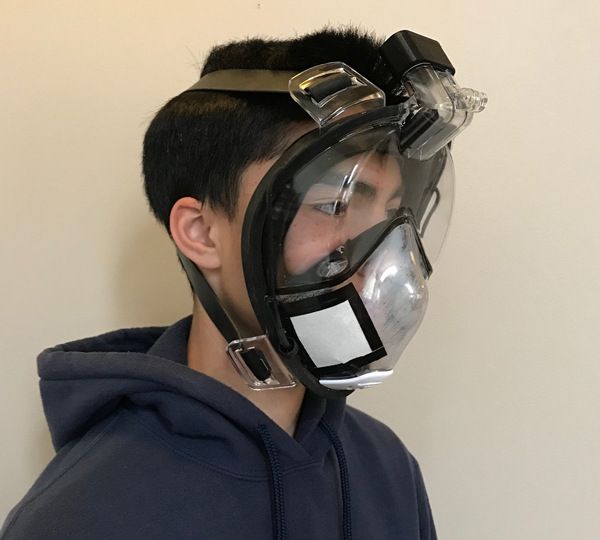
As the coronavirus pandemic continues to strengthen and spread across the United States, many medical professionals and first responders have been forced to work with limited personal protective equipment (PPE) and other medical devices. Biomedical Engineering Professor Binh Tran, a former emergency room medic for the Navy Reserve and design engineer at leading ventilator maker Puritan-Bennett, knows from experience how dangerous that lack of equipment can be.
“On the frontlines, physicians, nurses, and caregivers are at risk,” he said. “And with new evidence that COVID-19 is airborne, we’re realizing how dangerous it could be for them to have their eyes or other areas of their skin exposed.”
With this problem in mind, Tran has been working alongside his friends and family members to design innovative medical solutions that could be affordably and easily replicated on a larger scale. When it came to PPE, Tran worked with his ninth-grade son, Joseph, to conceive a creative solution for the lack of available surgical masks.
“My first thought was that maybe we were approaching this problem the wrong way and that instead of creating masks, we should focus on creating filters,” Tran said. “With the needs already so high, maybe if we could reuse the same masks and just replace the filters, we wouldn’t need to use as many materials.”

The final design devised by Tran and his son is a retrofitted snorkel mask. Using a 3-D printer, Tran adjusts the mask’s breathing tube to hold individual filters, which can be replaced easily. Tran has also researched various materials to be used for the filters, including vacuum cleaner bags or double-layer cotton.
“Instead of making a whole mask, we’re cutting a square piece of the filter and attaching that to the end of a breathing tube,” Tran said. “It’s much easier to do and does not require sewing. The disposable filters can be replaced like changing a band-aid. And because the mask isolates the breathing area, it doesn’t fog up the entire mask.”
Once that design is complete in early April, Tran hopes to put the instructions for how to build the breathing attachments and filters online for free, so that other people with 3-D printers could help manufacture the masks and donate them to area hospitals.
Another project Tran is working on is a ventilator prototype, inspired by portable bag valve masks, or Ambu-bags, used by first responders. Ambu-bags are portable and affordable but they require individuals to use their hands to squeeze the bags repeatedly, simulating airflow. With the help of his brother Ty Tran, managing partner at Applied Data Systems, Inc., and Stan Wong, a former colleague at Puritan-Bennett, Tran has been working on a low-cost design that would automate pumping the bags.
“The idea is basically a motor made with supplies you could normally buy for around $20. We would put an enclosure around the bag, a motor, and the pumping mechanism, and I’m hoping we could put it all together for around $250-350,” Tran said. “This could be an alternative to a high-cost ventilator that could supplement the breathing for someone with respiratory distress. Normally, a hospital-grade ventilator costs around $50,000.”
For Tran, the idea to work on these projects was an automatic one, inspired by years of engineering and medical training.
“This is what engineers do, especially biomedical engineers,” Tran said. “We’re not nurses on the front lines, but we are trying to solve human problems. At that next level, we can certainly work to offer our support.”
In the coming weeks, Tran hopes to make the designs for both the masks and the ventilators available for other interested parties to produce and distribute on a mass scale.
“The need is such that if we can put the designs out there, maybe other people can pick them up and produce them much faster than what we could do,” Tran said.
For more information or to access the designs, contact Tran at tran@cua.edu or 202-319-4285.